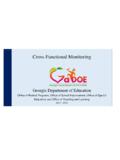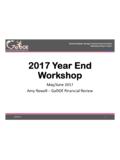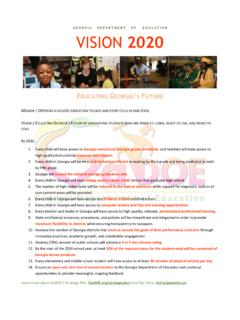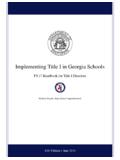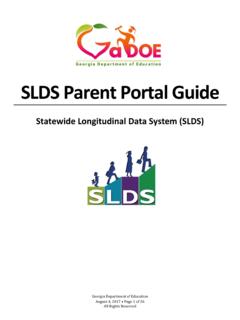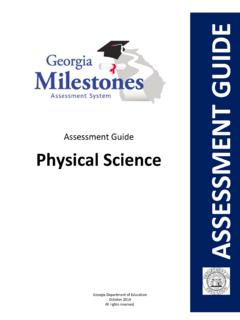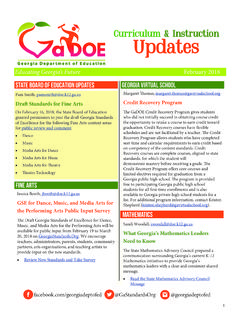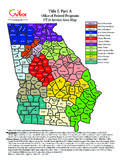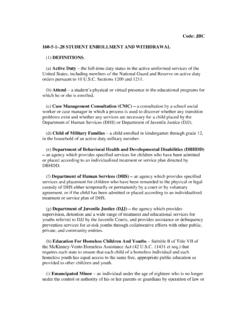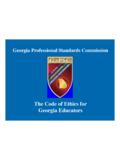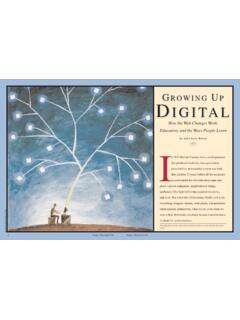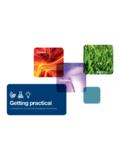Transcription of Business Management and Administration Career Cluster ...
1 georgia department of education Business Management and Administration Career Cluster Entrepreneurship Course Number: Course Description: How do you turn an idea into a Business ? Experience just that in this course! Entrepreneurship focuses on recognizing a Business opportunity, starting a Business , operating and maintaining a Business . Students will be exposed to the development of critical thinking, problem solving, and innovation in this course as they will either be the Business owner or individuals working in a competitive job market in the future. Integration of accounting, finance, marketing, Business Management , legal and economic environments will be developed throughout projects in this course. Working to develop a Business plan that includes structuring the organization, financing the organization, and managing information, operations, marketing, and human resources will be a focus in the course. Engaging students in the creation and Management of a Business and the challenges of being a small Business owner will be fulfilled in this course.
2 Various forms of technologies will be used to expose students to resources and application of Business principles for starting, operating and maintaining a Business . Professional communication skills and practices, problem-solving, ethical and legal issues, and the impact of effective presentation skills are enhanced in this course to prepare students to be college and Career ready. Employability skills are integrated into activities, tasks, and projects throughout the course standards to demonstrate the skills required by Business and industry. Competencies in the co-curricular student organization, Future Business Leaders of America (FBLA), are integral components of the employability skills standard for this course. Entrepreneurship is the third course in the pathway in the Business Management &. Administration Cluster . Students enrolled in this course should have successfully completed Introduction to Business & Technology and Legal Environment of Business .
3 After mastery of the standards in this course, students should be prepared to take the end of pathway assessment in this Career area. Course Standard 1. BMA-ENT-1. The following standard is included in all CTAE courses adopted for the Career Cluster /Pathways. Teachers should incorporate the elements of this standard into lesson plans during the course. The topics listed for each element of the standard may be addressed in differentiated instruction matching the content of each course. These elements may also be addressed with specific lessons from a variety of resources. This content is not to be treated as a unit or separate body of knowledge but rather integrated into class activities as applications of the concept. Standard: Demonstrate employability skills required by Business and industry. The following elements should be integrated throughout the content of this course. Communicate effectively through writing, speaking, listening, reading, and interpersonal abilities.
4 Person-to-Person Telephone and Cell Phone and Communicating At Listening Etiquette Email Etiquette Internet Etiquette Work Interacting with Telephone Using Blogs Improving Reasons, Benefits, Your Boss Conversations Communication Skills and Barriers Interacting with Barriers to Phone Using Social Media Effective Oral Listening Strategies Subordinates conversations Communication georgia department of education November 8, 2013 Page 1 of 8. All Rights Reserved georgia department of education Interacting with Making and Effective Written Ways We Filter Co-workers Returning Calls Communication What We Hear Interacting with Making Cold Calls Effective Nonverbal Developing a Suppliers Skills Listening Attitude Handling Effective Word Use Show You Are Conference Calls Listening Handling Giving and Receiving Asking Questions Unsolicited Calls Feedback Obtaining Feedback Getting Others to Listen Nonverbal Written Speaking Applications and Effective Communication Communication R sum s Communicating Writing Documents Using Language Completing a Job Application Nonverbally Carefully Reading Body Language Constructive One-on-One Writing a Cover Letter and mixed Messages Criticism in Writing Conversations Matching Verbal and Small Group Things to Include in a R sum.
5 Nonverbal communication Communication Improving Nonverbal Large Group Selling Yourself in a R sum . Indicators Communication Nonverbal Feedback Making Speeches Terms to Use in a R sum . Showing Confidence Involving the Describing Your Job Strengths Nonverbally Audience Showing Assertiveness Answering Questions Organizing Your R sum . Visual and Media Aids Writing an Electronic R sum . Errors in Presentation Dressing Up Your R sum . Demonstrate creativity by asking challenging questions and applying innovative procedures and methods. Teamwork and Problem Solving Meeting Etiquette Thinking Creatively Preparation and Participation in Meetings Taking Risks Conducting Two-Person or Large Group Meetings Building Team Communication Inviting and Introducing Speakers Facilitating Discussions and Closing Preparing Visual Aids Virtual Meetings Exhibit critical thinking and problem solving skills to locate, analyze and apply information in Career planning and employment situations.
6 Problem Customer Service The Application Process Interviewing Finding the Right Solving Skills Job Transferable Gaining Trust and Providing Information, Preparing for an Locating Jobs and Job Skills Interacting with Accuracy and Double Interview Networking Customers Checking Becoming a Learning and Giving Online Application Questions to Ask in Job Shopping Problem Customers What Process an Interview Online Solver They Want Identifying a Keeping Customers Following Up After Things to Include in Job Search Problem Coming Back Submitting an Application a Career Portfolio Websites Becoming a Seeing the Effective R sum s: Traits Employers Participation in Job Critical Thinker Customer's Point are Seeking Fairs georgia department of education November 8, 2013 Page 2 of 8. All Rights Reserved georgia department of education Managing Selling Yourself and Matching Your Talents to Considerations Searching the the Company a Job Before Taking a Job Classified Ads Handling Customer When a R sum Should Using Employment Complaints be Used Agencies Strategies for Landing an Customer Service Internship Staying Motivated to Search Model work readiness traits required for success in the workplace including integrity, honesty, accountability, punctuality, time Management , and respect for diversity.
7 Workplace Personal Employer Business Etiquette Communicating at Ethics Characteristics Expectations Work Demonstrating Demonstrating a Behaviors Employers Language and Handling Anger Good Work Ethic Good Attitude Expect Behavior Behaving Gaining and Objectionable Keeping Information Dealing with Appropriately Showing Respect Behaviors Confidential Difficult Coworkers Maintaining Demonstrating Establishing Avoiding Gossip Dealing with a Honesty Responsibility Credibility Difficult Boss Playing Fair Showing Demonstrating Your Appropriate Work Dealing with Dependability Skills Email Difficult Customers Using Ethical Being Courteous Building Work Cell Phone Etiquette Dealing with Conflict Language Relationships Showing Gaining Appropriate Work Responsibility Coworkers' Trust Texting Reducing Persevering Understanding Harassment Copyright Respecting Handling Social Networking Diversity Criticism Making Showing Truthfulness a Professionalism Habit Leaving a Job Ethically Apply the appropriate skill sets to be productive in a changing, technological, diverse workplace to be able to work independently and apply team work skills.
8 Expected Work Traits Teamwork Time Management Demonstrating Responsibility Teamwork Skills Managing Time Dealing with Information Overload Reasons Companies Use Teams Putting First Things First Transferable Job Skills Decisions Teams Make Juggling Many Priorities Managing Change Team Responsibilities Overcoming Procrastination Adopting a New Technology Problems That Affect Teams Organizing Workspace and Tasks Expressing Yourself on a Team Staying Organized Giving and Receiving Constructive Finding More Time Criticism Managing Projects Prioritizing Personal and Work Life Present a professional image through appearance, behavior and language. On-the-Job Etiquette Person-to-Person Etiquette Communication Etiquette Presenting Yourself Using Professional Meeting Business Creating a Good Impression Looking Professional Manners Acquaintances georgia department of education November 8, 2013 Page 3 of 8. All Rights Reserved georgia department of education Introducing People Meeting People for the First Keeping Phone Calls Dressing for Success Time Professional Appropriate Dress Showing Politeness Proper Use of Work Email Showing a Professional Attitude Business Meal Proper Use of Cell Phone Using Good Posture Functions Behavior at Work Proper Use in Texting Presenting Yourself to Parties Associates Behavior at Accepting Criticism Conventions International Etiquette Demonstrating Leadership Cross-Cultural Etiquette Working in a Cubicle Support of CTAE Foundation Course Standards and georgia Standards of Excellence L9-10 RST 1-10 and L9-10 WHST 1-10: georgia Standards of Excellence ELA/Literacy standards have been written specifically for technical subjects and have been adopted as part of the official standards for all CTAE courses.
9 Course Standard 2. BMA-ENT-2. Relate concepts and processes associated with entrepreneurial success and the personal traits and behaviors associated with successful entrepreneurial performance. Explain the role of entrepreneur in their own Business , the local community, and the economic development of the global market Categorize the characteristics of a successful entrepreneur, including the skills and ethical responsibilities Differentiate the unique traits, behaviors and processes that distinguish an entrepreneur from an employee or manager. Connect entrepreneurial success with personal traits and behaviors through analyzing successful entrepreneurs by identifying leadership style. Course Standard 3. BMA-ENT-3. Use and model concepts, strategies, and systems needed to interact and present effectively to others. Define and model importance of effective communication oral, written, and non- verbal with staff and customers. Demonstrate effective listening and speaking skills using proper grammar and appropriate vocabulary for target audience.
10 Explore the impact of and how to network with other Business contacts through work and social environments. Develop strategies for following up on Business leads and Business opportunities through multiple outlets (social media, existing prospect bases, cold calling, referrals, telemarketing, etc.). Exhibit effective introduction of self and Business to target market. Demonstrate appropriate and effective questioning techniques (open-ended) to identify needs of prospective clients. georgia department of education November 8, 2013 Page 4 of 8. All Rights Reserved georgia department of education Present benefits to satisfy and exceed customer needs and model closing a deal. Explore team dynamics, managing conflict, and handling difficult situations with customers, Business contacts, and staff. Course Standard 4. BMA-ENT-4. Apply fundamental Business concepts that affect Business decision making. Explain how the Law of Demand, the Law of Supply, prices, and profits work to determine production and distribution in a market economy.
